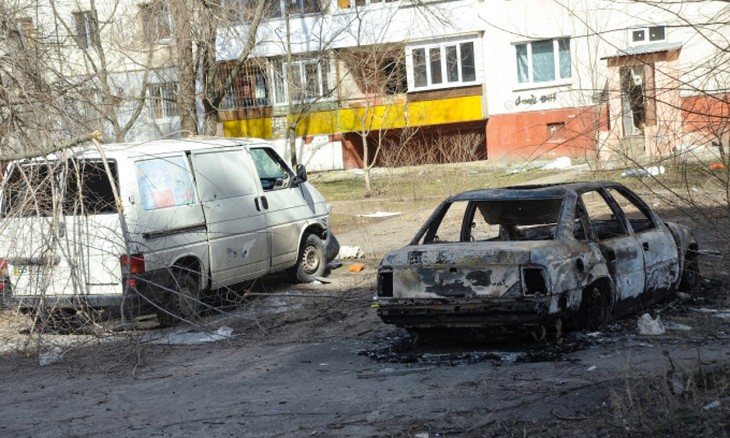(VOVWORLD) -100 days after Russia launched a “special military operation to de-Nazify and demilitarize Ukraine” on February 24, fierce fighting is continuing in eastern Ukraine. Diplomacy goes on as weapons and military equipment flow into Ukraine from the US and other Western countries.
 Destroyed vehicles after shelling in the city of Severodonetsk, Lugansk province, Ukraine, in mid-March. Photo: AFP. Destroyed vehicles after shelling in the city of Severodonetsk, Lugansk province, Ukraine, in mid-March. Photo: AFP.
|
Fighting has caused heavy losses in human lives and property for both Russia and Ukraine and severely impacted social stability and economic growth prospects in Europe and worldwide. The conflict has claimed the lives of thousands of Ukrainian soldiers and civilians, forced millions to flee their homes, and decimated Ukraine’s infrastructure and economy. Some reports estimate that Ukraine needs hundreds of billions of dollars and decades for reconstruction and recovery. The Russia-Ukraine conflict has become the worst crisis in Europe since World War II.
Unpredictability
Fighting is now focused in eastern Ukraine, where Russian forces have taken control of important cities and stepped up their attacks on other cities and towns. Russian forces are considered to still have a clear advantage over Ukraine, but the power balance is shifting as the West is providing Ukraine with heavier, more advanced weapons and combat equipment.
The US, the UK, and Germany promised on Wednesday that they will send Ukraine some of the most advanced weapons yet for shooting down aircraft and knocking out artillery.
German Chancellor Olaf Scholz pledged to deliver the IRIS-T class air defense system and tracking radar which is capable of detecting howitzers, mortars, and rocket artillery. IRIS-T is Germany's most advanced air defense system. Since the beginning of the conflict, Germany has supplied Ukraine with more than 15 million rounds of ammunition, 100,000 grenades, and 5,000 anti-tank mines.
Meanwhile, British Defense Secretary Ben Wallace announced that London will provide M270 launchers able to strike targets up to 80 km away.
US President Joe Biden pledged a new 700 million USD weapons package for Ukraine. That will include high mobility artillery rocket systems, which can accurately hit targets as far away as 80 km, a large amount of ammunition, counter-battery radar, air surveillance radar, Javelin anti-tank missiles, and anti-armor weapons.
 The US's High Mobility Artillery Rocket System (HIMARS). Photo: Gagadget The US's High Mobility Artillery Rocket System (HIMARS). Photo: Gagadget |
Analysts say the increased Western supply of heavy, modern weapons to Ukraine will significantly change the balance of forces on the Ukrainian battlefield. Russian Deputy Foreign Minister Sergey Ryabkov warned on Wednesday that Western arms aid to Ukraine cannot resolve the conflict. On the contrary, it increases the risk of direct clashes between Russia and the West.
Ongoing negotiation efforts
Although many rounds of negotiations have been held under international auspices and failed, world leaders continue to call on both sides to persist in diplomacy.
Turkish President Recep Tayyip Erdogan suggested on Tuesday that Russia and Ukraine hold a new round of talks in Istanbul, saying Ankara, with UN support, is ready to promote dialogue.
A few days earlier, addressing the World Economic Forum in Davos, Switzerland, former US Secretary of State Henry Kissinger said the West needs to dialogue with Russia to resolve the crisis. "Parties should be brought to peace talks within the next two months. Ukraine should've been a bridge between Europe and Russia,” he said.
According to Kissinger, the West needs to remember and appreciate the importance of Russia to Europe. “Looked at from a long-term point of view, Russia has been, for 400 years, an essential part of Europe, and European policy over that period of time has been affected, fundamentally, by its European assessment of the role of Russia,” Kissinger said.
Russian officials continue to affirm their willingness for diplomacy to end the conflict. Defense Committee Chairman of the State Duma Andrey Kartapolov said on Wednesday that Moscow's military operation in Ukraine could end if Kyiv agreed to negotiate. A day earlier, Chairwoman of the Council of the Russian Federation Valentina Matviyenko voiced Russia’s readiness to negotiate and sign agreements to achieve peace with Ukraine.